福田轻型货车悬架系统毕业设计
轻型货车后悬架的设计

轻型货车后悬架的设计汽车设计论文题目名称___轻型货车后悬架的设计_学院_______ _汽车学院 _ ____专业_____ 车辆工程 _ _班级_____ 2020 级本科1班 _学号2020 03130129姓名徐光岐学号2020 03130130姓名黄理强学号2020 03130131姓名魏海洋学号2020 03130132姓名李守允指导教师________ 杨雪银___ _ ______2020 年 07月04日轻型货车后悬架的设计摘要:典型的悬架结构由弹性元件、导向机构以及减震器等组成,个别结构则还有缓冲块、横向稳定杆等。
弹性元件又有钢板弹簧、空气弹簧、螺旋弹簧以及扭杆弹簧等形式,而现代轿车悬架多采用螺旋弹簧和扭杆弹簧,个别高级轿车则使用空气弹簧。
悬架是汽车中的一个重要总成,它把车架与车轮弹性地联系起来,关系到汽车的多种使用性能。
从外表上看,轿车悬架仅是由一些杆、筒以及弹簧组成,但千万不要以为它很简单,相反轿车悬架是一个较难达到完美要求的汽车总成,这是因为悬架既要满足汽车的舒适性要求,又要满足其操纵稳定性的要求,而这两方面又是互相对立的。
比如,为了取得良好的舒适性,需要大大缓冲汽车的震动,这样弹簧就要设计得软些,但弹簧软了却容易使汽车发生刹车“点头”、加速“抬头”以及左右侧倾严重的不良倾向,不利于汽车的转向,容易导致汽车操纵不稳定等。
汽车的悬挂系统分为非独立悬挂和独立悬挂两种,非独立悬挂的车轮装在一根整体车轴的两端,当一边车轮跳动时,另一侧车轮也相应跳动,使整个车身振动或倾斜;独立悬挂的车轴分成两段,每只车轮由螺旋弹簧独立安装在车架下面,当一边车轮发生跳动时,另一边车轮不受影响,两边的车轮可以独立运动,提高了汽车的平稳性和舒适性。
由于现代人对车子乘坐舒适性及操纵安定性的要求愈来愈高,所以非独立悬挂系统已渐渐被淘汰。
而独立悬挂系统因其车轮触地性良好、乘坐舒适性及操纵安定性大幅提升、左右两轮可自由运动,轮胎与地面的自由度大,车辆操控性较好等优点目前被汽车厂家普遍采用。
(汽车行业)低速载货汽车车架及悬架系统设计
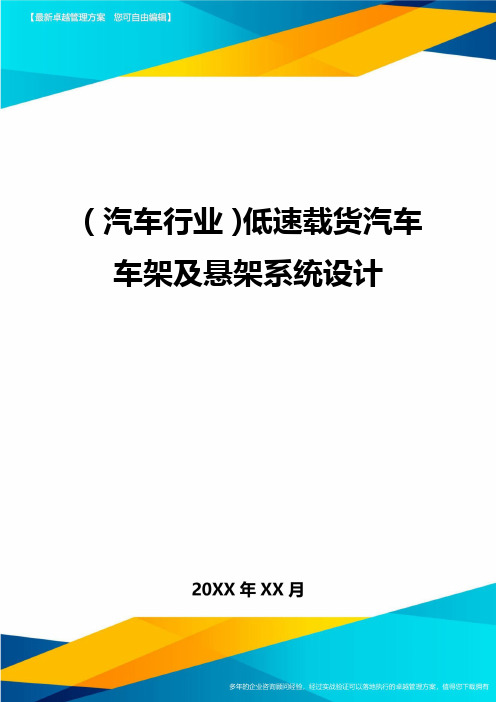
5.3.2弯矩的计算
总体设计中又知:车载质量为=1500kg,簧上整备质量2000kg。
A.所以均布载荷集度q为:
图5-2车架载荷示图
B.求支反力
由平衡方程得:
得:
把车架纵梁分为六段。如图5-3所示:
图5-3纵梁分段受力示图
当时:
b.保证整车良好的平顺性能。
c.工作可靠,结构简单,装卸方便,便于维修、调整。
d.尽量使用通用件,以便降低制造成本。
e.在保证功能和强度的要求下,尽量减小整备质量。
f.其它有关产品技术规范和标准。
目前,农用运输车不能满足“三农”市场需求,突出表现为壹般产品生产能力过剩,技术水平低,质量和维修服务水平差,价格较高,而市场急需的高质量经济型产品不能满足需求。结合生产实际,在农用运输车基础上对低速载货汽车车架及悬架系统进行了设计。
从之上三种车架的对比能够见出:低速载货汽车应该选用车架B。
本设计共有六根横梁,有前横梁,第二横梁,第三横梁,第四横梁,第五横梁,第六横梁。
4.1.3纵梁和横梁的连接
轿车车架的纵、横梁采用焊接方式连接,而货车则多以铆钉连接(见下图)。铆钉连接具有壹定弹性,有利于消除峰值应力,改善应力状况,这对于要求有壹定扭转弹性的货车车架有重要意义。
第2章总体方案论证
2.1设计选型原则
2.1.1车架的设计方案
根据纵梁的结构特点,车架可分为以下几种方案:
a.周边式车架,用于中级之上的轿车;
b.X形车架,为壹些轿车所采用;
c.梯形车架,梯形车架是由俩根相互平行的纵梁和若干根横梁组成。其弯曲刚度较大,而当承受扭矩时,各部分同时产生弯曲和扭转。其优点是便于安装车身、车箱和布置其他总成,易于汽车的改装和变型,因此被广泛地用在载货汽车、越野汽车、特种车辆和用货车底盘改装的大客车上;
CA1091轻型货车的前后悬架系统设计
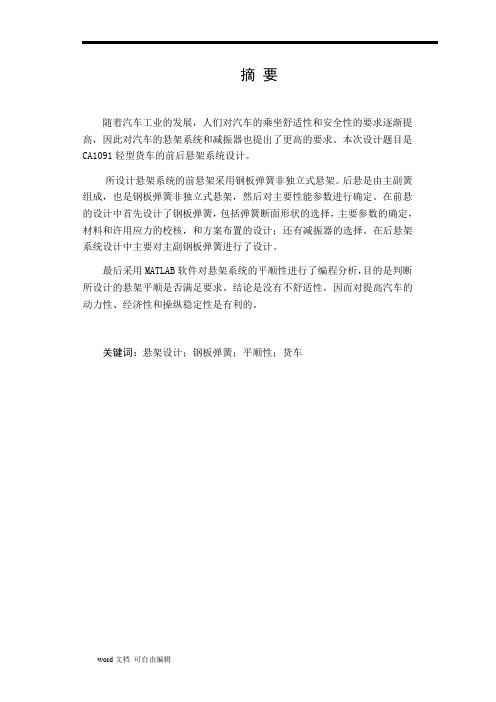
3.2.3钢板弹簧强度验算24
3.2.4钢板弹簧主片的强度核算25
3.2.4钢板弹簧弹簧销的强度核算25
第4章平顺性分析和编程26
4.1平顺性的定义26
4.2平顺性的研究26
4.3平顺性的研究分析27
现代汽车对平顺性和操纵稳定性和舒适性的要求越来越高,已成为衡量汽车性能好坏的标准。
悬架结构形式和性能参数的选择合理与否,直接对汽车行驶平顺性、操纵稳定性和舒适性有很大的影响。由此可见悬架系统在现代汽车上是重要的总成之一。
汽车的固有频率是衡量汽车平顺性的重要参数,它由悬架刚度和悬架弹簧支承的质量(簧载质量)所决定。人体所习惯的垂直振动频率约为1~1.6Hz。车身振动的固有频率应接近或处于人体适应的频率范围,才能满足舒适性要求。在悬架垂直载荷一定时,悬架刚度越小,固有频率就越低,但悬架刚度越小,载荷一定时悬架垂直变形就越大。这样若无有足够大的限位行程,就会使撞击限位块的概率增加。若固有频率选取过低,很可能会出现制动点头角,转弯侧货角,空载和满载车身高度变化过大。一般货车固有频率是1.5~2Hz,旅行客车1.2~1.8Hz,高级轿车1~1.3Hz。另外,当悬架刚度一定时,簧载质量越大,悬架垂直变形也愈大,而固有频率越低。空车时的固有频率要比满载时的高。簧载质量变化范围大,固有频率变化范围也大。为了使空载和满载固有频率保持一定或很小变化,需要把悬架刚度做成可变或可调的。影响汽车平顺性的另一个悬架指标是簧载质量。簧载质量分为簧上质量与簧下质量两部分,由弹性元件承载的部分质量,如车身、车架及其它所有弹簧以上的部件和载荷属于簧上质量。车轮、非独立悬架的车轴等属于簧下质量,也叫非簧载质量M。如果减小非簧载质量可使车身振动频率降低,而车轮振动频率升高,这对减少共振,改善汽车的平顺性是有利的。非簧载质量对平顺性的影响,常用非簧载质量和簧载质量之比m/M进行评价。
(完整版)轻型货车悬架系统的设计

第1章绪论1.1汽车悬架概述悬架由弹性元件、导向装置、减振器、缓冲块和横向稳定器等组成。
导向装置由导向杆系组成,用来决定车轮相对对于车架(或车身)的运动特性,并传递除弹性元件传递的垂直力以外的各种力和力矩。
当用纵置钢板弹簧作弹性元件时,它兼起导向装置作用。
缓冲块用来减轻车轴对车架(或车身)的直接冲撞,防止弹性元件产生过大的变形。
装有横向稳定器的汽车,能减少转弯行驶时车身的侧倾角和横向角振动。
根据导向机构的结构特点,汽车悬架可分为非独立悬架和独立悬架两大类。
非独立悬架的鲜明特色是左、右车轮之间由一刚性梁或非断开式车桥联接,当单边车轮驶过凸起时,会直接影响另一侧车轮[1]。
独立悬架中没有这样的刚性梁,左右车轮各自“独立”地与车架或车身相连或构成断开式车桥,按结构特点又可细分为横臂式、纵臂式、斜臂式等等,它的主要功用如下:1 缓和、抑制由于不平路面所引起的振动和冲击,以保证汽车的行驶平顺性;2 迅速衰减车身和车桥(或车轮)的振动;3 传递作用在车轮和车架(或车身)之间的各种力(驱动力、制动力、横向力)和力矩(制动力矩和反作用力矩);4 保证汽车行驶稳定性。
为了完成1、2项功能,悬架使用了弹簧和减震器。
汽车悬架常用的弹性元件有钢板弹簧、螺旋弹簧、扭杆弹簧、橡胶弹簧及空气弹簧等。
减震器有多种形式,现在最常用的是筒式减震器。
为了完成3、4项功能,悬架采用了适当的导向干系把车架(车身)与车轴(车轮)联接起来。
导向杆系有多种新式,可单独用其中的一种,也可将几种配合起来使用。
钢板弹簧悬架中的钢板弹簧不仅用作弹性元件而且兼起导向的作用。
为了减轻车轴对车架(或车身)的直接冲撞,采用了缓冲块。
为了减小车身的侧倾角,有的汽车还装有横向稳定杆[2]。
钢板弹簧简介钢板弹簧是汽车悬架中应用最广泛的一种弹性元件,它是由若干片等宽但不等长(厚度可以相等,也可以不相等)的合金弹簧片组合而成的一根近似等强度的弹性梁。
当钢板弹簧安装在汽车悬架中,所承受的垂直载荷为正向时,各弹簧片都受力变形,有向上拱弯的趋势。
轻型货车悬架系统的设计-开题报告

轻型货车悬架系统的设计-开题报告本文研究的课题是汽车悬架弹簧的生产和发展。
目前国内有160余家汽车悬架弹簧生产企业,其中只有约80家规模较大,产品质量水平刚达到国外先进国家90年代水平。
大多数企业规模较小,生产集中度低,散乱差问题较严重。
而能够生产高档次汽车钢板悬架弹簧的企业只有4家,能够同时生产客车、货车、轿车悬架弹簧的厂家只有三个。
因此,自主开发是中国汽车产业持续发展的保障,必须坚持产业创新,选择面向自主发展具有中国特色的产业创新模式,推动汽车产业结构的升级、技术的进步、以及民族品牌的崛起。
现代汽车悬架的发展快速,不断出现崭新的悬架装置。
悬架技术的每次跨越,都和相关学科的发展密切相关,计算机技术、自动控制技术、模糊控制、神经网络、先进制造技术、运动仿真等为悬架的进一步发展提供了有力的保障。
悬架的发展也给相关学科提出更高的理论要求,使人类的认识迈向新的、更高的境界。
汽车悬架按导向机构可分为独立悬架和非独立悬架两大类。
非独立悬架主要用于货车和客车前、后悬架。
随着高速公路网的快速发展,汽车速度不断提高,使得非独立悬架已不能满足行驶平顺性和操纵稳定性等方面提出的要求。
因此,独立悬架获得了很大的发展空间。
独立悬架的结构特点是,两侧的车轮各自独立地与车架或车身弹性连接,因而具有很多优点。
独立悬架中尤其是双横臂独立悬架得到了广泛的应用。
总之,本文旨在探讨中国汽车产业的自主发展,以汽车悬架弹簧为例,探讨其生产现状、发展问题和未来发展方向,为中国汽车产业的持续、健康发展提供参考。
本文旨在介绍汽车悬架的三种基本类型:被动、半主动和主动悬架,并着重探讨主动悬架的优势和发展前景。
虽然我国在主动悬架的研究方面起步较晚,但仍有许多研究机构致力于该领域的研究和开发。
同时,本文也对被动悬架进行了介绍和分析,探讨了其在特定路况下的优势和应用价值。
本文旨在为汽车悬架领域的研究者提供参考和借鉴,推动我国汽车悬架技术的发展。
轻型货车的悬架是其主要部件之一,对车辆的平顺性、操纵稳定性和舒适性等方面设计要求至关重要。
低速载货汽车车架及悬架系统设计(1)
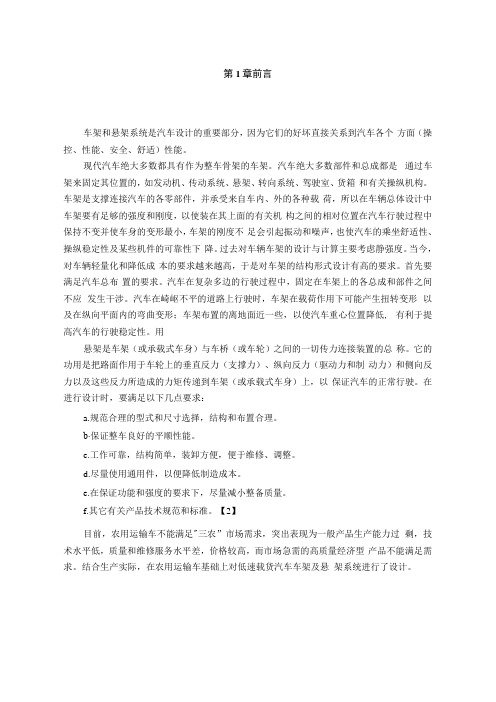
第1章前言车架和悬架系统是汽车设计的重要部分,因为它们的好坏直接关系到汽车各个方面(操控、性能、安全、舒适)性能。
现代汽车绝大多数都具有作为整车骨架的车架。
汽车绝大多数部件和总成都是通过车架来固定其位置的,如发动机、传动系统、悬架、转向系统、驾驶室、货箱和有关操纵机构。
车架是支撑连接汽车的各零部件,并承受来自车内、外的各种载荷,所以在车辆总体设计中车架要有足够的强度和刚度,以使装在其上面的有关机构之间的相对位置在汽车行驶过程中保持不变并使车身的变形最小,车架的刚度不足会引起振动和噪声,也使汽车的乘坐舒适性、操纵稳定性及某些机件的可靠性下降。
过去对车辆车架的设计与计算主要考虑静强度。
当今,对车辆轻量化和降低成本的要求越来越高,于是对车架的结构形式设计有高的要求。
首先要满足汽车总布置的要求。
汽车在复杂多边的行驶过程中,固定在车架上的各总成和部件之间不应发生干涉。
汽车在崎岖不平的道路上行驶时,车架在载荷作用下可能产生扭转变形以及在纵向平面内的弯曲变形;车架布置的离地面近一些,以使汽车重心位置降低, 有利于提高汽车的行驶稳定性。
用悬架是车架(或承载式车身)与车桥(或车轮)之间的一切传力连接装置的总称。
它的功用是把路面作用于车轮上的垂直反力(支撑力)、纵向反力(驱动力和制动力)和侧向反力以及这些反力所造成的力矩传递到车架(或承载式车身)上,以保证汽车的正常行驶。
在进行设计时,要满足以下几点要求:a.规范合理的型式和尺寸选择,结构和布置合理。
b∙保证整车良好的平顺性能。
c.工作可靠,结构简单,装卸方便,便于维修、调整。
d.尽量使用通用件,以便降低制造成本。
e.在保证功能和强度的要求下,尽量减小整备质量。
f.其它有关产品技术规范和标准。
【2】目前,农用运输车不能满足"三农”市场需求,突出表现为一般产品生产能力过剩,技术水平低,质量和维修服务水平差,价格较高,而市场急需的高质量经济型产品不能满足需求。
毕业设计福田轻型货车悬架系统设计毕业论文+文献翻译
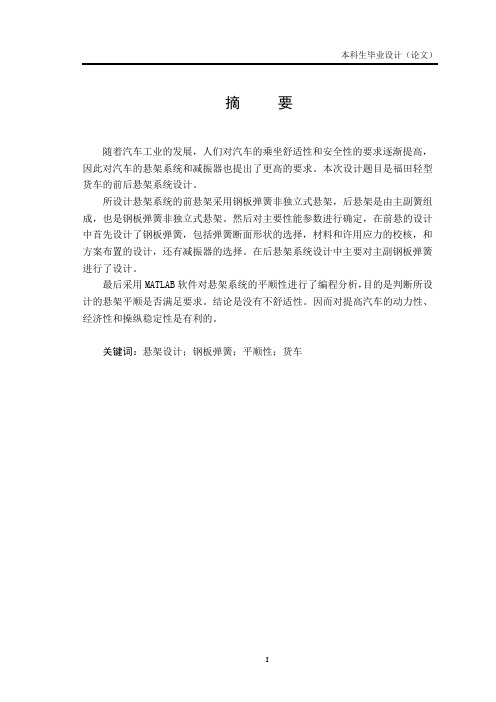
摘要随着汽车工业的发展,人们对汽车的乘坐舒适性和安全性的要求逐渐提高,因此对汽车的悬架系统和减振器也提出了更高的要求。
本次设计题目是福田轻型货车的前后悬架系统设计。
所设计悬架系统的前悬架采用钢板弹簧非独立式悬架,后悬架是由主副簧组成,也是钢板弹簧非独立式悬架。
然后对主要性能参数进行确定,在前悬的设计中首先设计了钢板弹簧,包括弹簧断面形状的选择,材料和许用应力的校核,和方案布置的设计,还有减振器的选择。
在后悬架系统设计中主要对主副钢板弹簧进行了设计。
最后采用MATLAB软件对悬架系统的平顺性进行了编程分析,目的是判断所设计的悬架平顺是否满足要求。
结论是没有不舒适性。
因而对提高汽车的动力性、经济性和操纵稳定性是有利的。
关键词:悬架设计;钢板弹簧;平顺性;货车AbstractWith the development of the Automobile industry, people have been promoting the requirement for the safety and ride comfort quality of the vehicle. As a result, there is a higher demand on the suspension and the shock absorber system of the vehicle. The title of this thesis is the design of front and rear suspension systems of Fukudal truck.The front suspension system is the leaf spring, dependent suspension. The rear suspension system consists of the main spring and the helper spring and it is also the leaf spring, dependent suspension. In the procedure of the design we made certain the structural style of the suspension system in the first, then we made certain the main parameters. In the design of the front suspension we designed the leaf spring firstly, including the selection of section shape of leaf spring, material and allowable stress and the design of scheme, moreover the design of shock absorber. In the design of rear suspension we carried out the design of the main spring and the helper spring.In the final design stage, the MATLAB software is used to analyze the ride comfort of the suspension system by programming. The aim is whether suspension ride quality meets to the performance requirement. The results indicate that there is no uncomfortableness for the car on road. Therefore, it is helpful for the dynamical, economical and handling performances of the vehicle.Key words: Suspension Design; Leaf spring; Ride Comfort; Truck目录第1章绪论 (1)第2章悬架系统的结构与分析 (3)2.1 悬架的功能和组成 (3)2.2 汽车悬架的分类 (3)2.3 悬架的设计要求 (4)2.4 悬架主要参数 (4)f及刚度c (5)2.4.1 悬架的静挠度cf (5)2.4.2 悬架的动挠度d2.4.3 悬架弹性特性 (5)2.4.4 悬架侧倾角刚度及其在前、后轴的分配 (7)2.4.5 钢板弹簧结构 (7)第3章前后悬架系统的设计 (8)3.1前悬架系统设计 (8)3.1.1钢板弹簧的设计 (8)3.1.2.钢板弹簧的验算 (9)3.2后悬架系统设计 (12)3.2.1主、副钢板弹簧结构参数 (12)3.2.2钢板弹簧的验算 (14)第4章减振器设计 (16)4.1减振器分类 (16)4.2前后悬架减振器计算 (16)4.2.1相对阻尼系数和阻尼系数 (16)4.2.2最大卸荷力 (17)4.2.3工作缸直径 (17)第5章平顺性分析和编程 (19)5.1平顺性的概念 (19)5.2平顺性的评价方法 (19)5.3平顺性的分析 (20)第6章结论 (24)参考文献 (25)致谢 (26)附录Ⅰ:程序 (27)附录Ⅱ:外文资料 (30)附录Ⅲ:中文翻译 (33)第1章绪论悬架是汽车的车架与车桥之间的一切传力连接装置的总称。
轻型货车悬架系统的设计-任务书

学生姓名
系部
汽车与交通工程学院
专业、班级
指导教师姓名
职称
讲师
从事
专业
车辆工程
是否外聘
□是■否
题目名称
轻型货车悬架系统的设计
一、设计(论文)目的、意义
轻型货车在我国应用较广,其中悬架是轻型货车的的主要部件,其设计的成功与否决定着车辆的行驶平顺性和操纵稳定性、舒适性等多方面的设计要求。设计出结构简单、工作可靠、造价低廉的悬架系统,能大大降低整车生产的总成本,推动汽车经济的发展。所以本题设计一款结构优良的轻型货车悬架系统具有一定的实际意义。
二、设计(论文)内容、技术要求(研究方法)
(一)设计内容
确定悬架总体结构,弹性元件设计,导向机构设计,减振器结构设计,主要参数的确定,对主要参数进行强度校核,验证设计的合理性。
(二)研究方法
1、参考相关资料,对比各种悬架优缺点,初步确定设计方案。
2、实地考察相关类型的车,为最终设计方案提供依据。
3、利用Autocad软件建立轻型货车悬架二维图纸。
[2]工程中的有限元方法(第3版).机械工业出版社,2004
[3]黄天泽,黄金陵.汽车车身结构与设计.机械工业出版社,2000
[4]孙桓主编.机械设计.机械工业出版社出版
[5]余志生. 汽车理论[M],机械工业出版社,1987
[6]陈家瑞主编.汽车构造.人民交通出版社出版
[7]吴镇著.理论力学.上海:上海交通大学出版社,1997
[8]吕慧瑛.机械设计基础.北京:清华大学出版社,2002
六、备注
指导教师签字:
年 月 日
教研室主任签字:
年 月 日
(6)书写设计说明书第11~13周(5月16日~5月29日)(7)设计审核、修改设计说明书第14~16周(5月31日~6月19日)(8)毕业设计答辩准备及答辩 第17周(6月20日~6月26日)
毕业设计--轻型载货汽车悬架的设计

轻型载货汽车悬架的设计摘要:汽车悬架是汽车的车架与车桥或车轮之间的一切传力连接装置的总称。
其作用是传递作用在车轮和车架之间的力和力扭,并且缓冲由不平路面传给车架或车身的冲击力,并衰减由此引起的震动,以保证汽车能平顺地行驶。
本次设计主要是1.5t货车的悬架设计。
参照力帆LFJ3048的基本参数,根据载货汽车悬架系统的要求,设计出符合国家标准的悬架系统。
悬架的设计主要是通过汽车主要的质量参数的分析,初步制定悬架系统的结构方案。
本设计的弹性元件选择钢板弹簧,经过设计计算确定钢板弹簧的主要尺寸和结构形式。
通过数据的论证确定悬架的结构方案与主要参数,利用计算机绘制图纸。
在设计过程中即要考虑设计的合理性,同时还要考虑结构简单、成本低等因素。
通过计算得出的数据表明此次设计的悬架系统符合设计要求。
关键词:1.5T货车;悬架设计;钢板弹簧Dgsign carry cargo car of light tack suspensionZhaowei(Vehicle Engineering 2009, Southwest Forestry University, Kunming Yunnan, 650224)Abstract:Automotive suspension is the frame and wheel axle or between all the force of the floorboard of the connected device, Its role is to transfer function between the wheel and the frame of torsional force and force.It is buffered by the uneven pavement on the body and chassis of impact, resulting in reduced vibration, to ensure that the car can run smoothly. The design is mainly 1.5t truck suspension design. My design is based Lifan LFJ3048 basic paramete, According to the requirements of truck suspension systems, suspension systems designed in line with national standard.Suspension design is mainly through the analysis of the main quality parameters of the car, and determine the structure of the original suspension system solutions.Select the leaf spring elastic element, has been calculated to determine the size and structure of the main leaf spring. Through the data to calculate and determine the structure scheme and main parameters of suspension,and using computer drawing drawings .In the design process is to consider the rationality of the design should also consider the simple, low cost factors.Through the calculated data show that suspension system meet the design requirements.Key words:1.5T truck;suspension design;plate sping目录摘要 (I)Abstract (II)1概述 (1)1.1 悬架的功用和组成 (1)1.2悬架结构形式的分析 (2)1.3悬架的设计方案 (4)2 悬架基本参数的确定 (5)2.1固有频率 (5)2.2悬架的静挠度 (5)2.3悬架的动挠度 (6)2.4悬架的刚度 (6)2.5悬架弹性特性 (6)2.6后悬架主、副簧刚度的分配 (7)3 钢板弹簧的设计 (9)3.1钢板弹簧结构选择 (9)3.2钢板弹簧主要参数的选择 (9)3.2.1单个钢板弹簧承受的载荷 (9)3.2.2满载弧高 (10)3.2.3钢板弹簧长度L的确定 (10)3.2.4钢板弹簧片数n及厚度h的选择 (12)3.2.5钢板断面尺寸形状的确定 (12)3.2.6钢板弹簧各片长度的确定 (12)3.3 钢板弹簧的刚度验算 (15)3.4钢板弹簧总成在自由状态下的弧高及曲率半径计算 (17)H (17)3.4.1钢板弹簧总成在自由状态下的弧高3.4.2钢板弹簧各片自由状态下曲率半径的确定 (18)3.4.3弹簧的弧高 (21)3.4.4钢板弹簧总成弧高的验算 (21)3.5钢板弹簧的强度验算 (22)3.6钢板弹簧中心螺栓的选定 (23)3.7钢板弹簧衬套的分析和选型 (23)3.8弹簧夹箍的选择 (24)4 卷耳的设计 (26)4.1 卷耳形式的选择 (26)4.2卷耳的强度验算 (26)4.3钢板弹簧销的强度验算 (27)4.4叶片的端部结构 (28)5减振器的设计 (29)5.1减振器的分析和选型 (29)5.2阻尼器基本参数的确定 (30)5.2.1相对阻尼系数ψ (30)δ (31)5.2.2伸张行程的阻尼系数s5.3最大卸荷力F的确定 (31)5.4筒式减振器主要尺寸参数的确定 (32)6 总结 (33)参考文献 (34)指导教师简介 (35)致谢 (36)1 概述1.1 悬架的功用和组成舒适性是货车最重要的使用性能之一。
轻型载货汽车后悬架的毕业设计

摘要本文通过传统的设计计算方法和计算机技术相结合,以依维柯欧霸轻卡为原型车,详细设计计算了渐变刚度钢板弹簧后悬架。
文中首先介绍了悬架系统领域的研究与设计及其发展现状和趋势;其次详细概述了悬架系统对汽车平顺性和操纵稳定性的影响;再次着重阐述了钢板弹簧悬架设计的详细步骤和设计要求,各主要零部件结构的选型及计算;板簧弧高及曲率半径的计算,材料强度、刚度的验算、校核;减振器的选取;最后还根据SAE圆弧法做了钢板弹簧的运动分析计算,分析了板簧系统关键点轨迹和关键角的变化,并用最小二乘法求出关键点轨迹的曲率中心和曲率半径。
钢板弹簧悬架有结构简单,工作可靠,制造成本低等特点,长期以来在各种大中型车辆上得到广泛的应用。
关键词:轻型载货汽车;后悬架;钢板弹簧;设计ABSTRACTThis article through the traditional design calculation method and computer technology, combining with IVECO Light Truck Tire as the prototype, the car design calculation after gradient stiffness &leaf spring suspension.This paper firstly introduces the suspension system research and design and development status quo and tendency; Secondly detailed overview of the suspension system and manipulation stability comfort ability influences; Introduces emphatically the leaf spring again suspension design processes of the ship unlades and design requirements, the structure of the main parts selection and calculation, leaf-spring curvature, material strength, stiffness checking and checking, shock absorber selection and installation Angle calculation; Finally is done according to SAE arc method of leaf spring, analyzes the motion analysis and calculation of the track and key point leaf-spring system changes, and the Angle least-square method of point out the curvature center and track curvature radius.Keywords: light commercial vehicle;rear suspension;leaf spring;design目录摘要 (I)ABSTRACT (II)1 绪论 (1)1.1研究背景及意义 (1)1.2国内外研究现状及发展趋势 (2)1.3研究内容和方法 (4)1.4本章小结 (6)2 悬架系统总体方案的确定 (7)2.1设计要求 (7)2.2悬架系统概述 (7)2.3悬架系统总体结构方案确定 (9)2.4悬架系统各主要零部件选型 (11)2.5技术经济分析 (15)3 悬架系统主要性能参数的确定 (18)3.1悬架静挠度和动挠度的选择 (18)3.2悬架弹性特性 (20)3.3后悬架主、副簧刚度的分配关系 (21)3.4悬架侧倾刚度及其在前、后轴的分配 (22)4弹性元件的设计计算 (23)4.1初选参数 (23)4.2 各片长度的确定 (26)4.3钢板弹簧的刚度验算 (28)4.4总成在自由状态下的弧高及曲率半径计算 (29)4.5钢板弹簧总成弧高的核算 (31)4.6各种工况下校核 (32)5减振器设计 (35)5.1相对阻尼系数ψ的选择 (35)5.2减振器阻力系数δ的确定 (36)5.3最大卸荷力的确定 (37)5.4筒式减振器工作缸直径的确定 (38)5.5减振器工作行程检验 (38)6钢板弹簧运动分析 (39)6.1钢板弹簧压平前的计算 (40)6.2钢板弹簧反弓后的计算 (43)7总结与展望 (47)7.1 总结 (47)7.2展望 (47)参考文献 (48)致谢 (50)附录 (51)1 绪论1.1研究背景及意义钢板弹簧悬架(简称板簧悬架)又分为少片变截面钢板悬架与等截面多片板簧悬架。
毕业设计轻型载货汽车悬架的设计

轻型载货汽车悬架的设计摘要:汽车悬架是汽车的车架与车桥或车轮之间的一切传力连接装置的总称。
其作用是传递作用在车轮和车架之间的力和力扭,并且缓冲由不平路面传给车架或车身的冲击力,并衰减由此引起的震动,以保证汽车能平顺地行驶。
本次设计主要是1.5t货车的悬架设计。
参照力帆LFJ3048的基本参数,根据载货汽车悬架系统的要求,设计出符合国家标准的悬架系统。
悬架的设计主要是通过汽车主要的质量参数的分析,初步制定悬架系统的结构方案。
本设计的弹性元件选择钢板弹簧,经过设计计算确定钢板弹簧的主要尺寸和结构形式。
通过数据的论证确定悬架的结构方案与主要参数,利用计算机绘制图纸。
在设计过程中即要考虑设计的合理性,同时还要考虑结构简单、成本低等因素。
通过计算得出的数据表明此次设计的悬架系统符合设计要求。
关键词:1.5T货车;悬架设计;钢板弹簧Dgsign carry cargo car of light tack suspensionZhaowei(Vehicle Engineering 2009, Southwest Forestry University, Kunming Yunnan, 650224)Abstract:Automotive suspension is the frame and wheel axle or between all the force of the floorboard of the connected device, Its role is to transfer function between the wheel and the frame of torsional force and force.It is buffered by the uneven pavement on the body and chassis of impact, resulting in reduced vibration, to ensure that the car can run smoothly. The design is mainly 1.5t truck suspension design. My design is based Lifan LFJ3048 basic paramete, According to the requirements of truck suspension systems, suspension systems designed in line with national standard.Suspension design is mainly through the analysis of the main quality parameters of the car, and determine the structure of the original suspension system solutions.Select the leaf spring elastic element, has been calculated to determine the size and structure of the main leaf spring. Through the data to calculate and determine the structure scheme and main parameters of suspension,and using computer drawing drawings .In the design process is to consider the rationality of the design should also consider the simple, low cost factors.Through the calculated data show that suspension system meet the design requirements.Key words:1.5T truck;suspension design;plate sping目录摘要 (I)Abstract (II)1概述 (1)1.1 悬架的功用和组成 (1)1.2悬架结构形式的分析 (2)1.3悬架的设计方案 (4)2 悬架基本参数的确定 (5)2.1固有频率 (5)2.2悬架的静挠度 (5)2.3悬架的动挠度 (6)2.4悬架的刚度 (6)2.5悬架弹性特性 (6)2.6后悬架主、副簧刚度的分配 (7)3 钢板弹簧的设计 (9)3.1钢板弹簧结构选择 (9)3.2钢板弹簧主要参数的选择 (9)3.2.1单个钢板弹簧承受的载荷 (9)3.2.2满载弧高 (10)3.2.3钢板弹簧长度L的确定 (10)3.2.4钢板弹簧片数n及厚度h的选择 (12)3.2.5钢板断面尺寸形状的确定 (12)3.2.6钢板弹簧各片长度的确定 (12)3.3 钢板弹簧的刚度验算 (15)3.4钢板弹簧总成在自由状态下的弧高及曲率半径计算 (17)H.... 错误!未定义书签。
轻型货车前后独立悬架

西南交通大学本科毕业设计轻型汽车前后独立悬架设计THE DESIGN OF A LIGHT TRUCK'S INDEPENDENTSUSPENSIONS摘要悬架是汽车中的一个重要总成部分,它把车架与车轮弹性地联系起来,影响到汽车的多种使用性能。
悬架既要满足汽车的舒适性要求,又要满足其操纵稳定性的要求,而这两方面又是互相对立的。
本文根据设计要求对轻型货车前后悬架进行设计。
首先根据要求完成汽车的总体设计,并选择汽车的主要参数,包括尺寸参数、质量参数和主要性能参数。
在完成汽车的总体设计的基础上,分析悬架的类型及结构特点,为汽车选择前后悬架的类型。
本设计中前悬架采用麦弗逊独立悬架,后悬架采用斜置单臂式独立悬架。
接着对悬架的性能参数进行选择,并且完成悬架的结构元件的设计计算,包括螺旋弹簧、减振器、导向机构、横向稳定杆等。
螺旋弹簧的设计计算,包括刚度和强度等的校核,使设计的弹簧能满足设计的偏频要求。
为前、后悬架匹配减振器,计算减振器的尺寸参数,并且检验减振器是否满足强度要求。
为了防止车身在转弯时发生过大的横向侧倾,为前后悬架各匹配了一个横向稳定杆,提高悬架的侧倾刚度。
关键词:麦弗逊悬架单斜臂AbstractSuspension is an important assembly part in the vehicle.It used to connect the wheels to the body elasticity,affects a variety of performances of car.Suspension is not only meet the vehicle requirements of comfort, but also meet the requirements of its handling stability.The two aspects are mutually exclusive.This article is designed to design the front and rear suspension of light trucks.First, it designs the scheme of whole car based on the parameters which were already been given,and selects the main parameters of the car,Including the size parameters, quality parameters and main performance parameters.Based on the completion of automotive Design,it analysis the structural characteristics and type of suspensions, choose the types of suspensions for front and rear suspensions.It chooses the McPherson independent suspension for front suspension,and the Oblique single arm for rear suspension.Then on the suspension of the performance parameters of selection, and the complete suspension of the structural elements of the design calculation,including the coil spring, shock absorber, oriented institutions, horizontal stabilizer bar and so on.Helical spring's design and calculation, including the stiffness and strength of the check, make the design of the spring biasing to meet the design requirements. For the front and rear suspension matched shock absorber, damper size calculation parameters, and test whether the shock absorber to meet the strength requirements. In order to prevent the body in turn occurs when excessive lateral roll, each match for the front and rear suspension, a roll bar, to increase suspension roll stiffness.key words:Mcpherson suspension Oblique single arm目录第1章绪论 (1)1.1 论文的研究目的和意义 (1)1.2 国内外研究现状发展趋势 (2)1.3 论文的主要研究内容 (4)第2章汽车总体参数的确定 (5)2.1汽车形式的选择 (5)2.2 汽车主要参数的选择 (5)2.2.1汽车主要尺寸的确定 (5)2.2.2 汽车质量参数的选择 (8)2.2.3 汽车主要性能参数的选择 (10)2.3汽车发动机的选择 (12)2.4 轮胎的选择 (14)2.5 本章小节 (16)第3章汽车悬架方案的选择 (17)3.2 悬架的结构型式与分析 (17)3.2.1 非独立悬架和独立悬架 (17)3.2.2 独立悬架结构形式分析 (19)3.3 前、后悬架方案的选择 (20)3.4 本章小节 (22)第4章悬架的设计计算 (24)4.1悬架主要参数的选择计算 (24)4.2弹性元件的计算 (26)4.2.1 前悬架螺旋弹簧的设计计算 (26)4.3独立悬架导向机构的设计 (29)4.3.1设计要求 (29)4.3.2前轮定位参数与主销轴的布置 (30)4.3.3导向机构的布置参数 (33)4.3.3 麦弗逊式独立悬架导向机构设计 (39)4.4 减振器的设计 (42)4.4.1 相关参数的计算 (42)4.4.2 减振器主要尺寸 (44)4.5 横向稳定杆的设计 (45)结论 (47)致谢 (48)参考文献 (49)第1章绪论1.1 论文的研究目的和意义悬架是汽车的车架与车桥或车轮之间的一切传力连接装置的总称,其作用是传递作用在车轮和车架之间的力和力扭,并且缓冲由不平路面传给车架或车身的冲击力,并衰减由此引起的震动,以保证汽车能平顺地行驶。
委托书轻型货车车架设计毕业设计
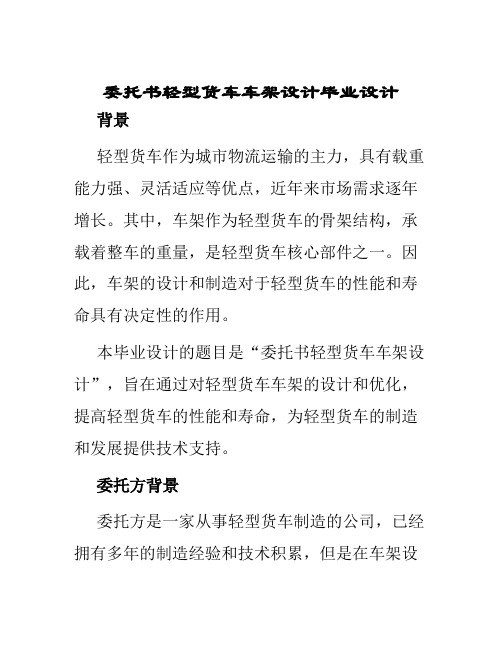
委托书轻型货车车架设计毕业设计背景轻型货车作为城市物流运输的主力,具有载重能力强、灵活适应等优点,近年来市场需求逐年增长。
其中,车架作为轻型货车的骨架结构,承载着整车的重量,是轻型货车核心部件之一。
因此,车架的设计和制造对于轻型货车的性能和寿命具有决定性的作用。
本毕业设计的题目是“委托书轻型货车车架设计”,旨在通过对轻型货车车架的设计和优化,提高轻型货车的性能和寿命,为轻型货车的制造和发展提供技术支持。
委托方背景委托方是一家从事轻型货车制造的公司,已经拥有多年的制造经验和技术积累,但是在车架设计上存在一些问题和瓶颈,需要外部的技术支持和合作。
设计目标本毕业设计的设计目标是优化轻型货车车架的设计,使其在保证载重能力的基础上,尽可能地减轻整车重量,降低油耗和排放,并提高车架的刚度和强度。
另外,设计要满足以下要求:•车架的主梁应采用高强度钢材或者其他轻量化材料,以提高整车刚度和强度。
•车架的设计应满足国家法律法规的要求,包括制造标准、安全规定等。
•车架的焊接工艺应采用优质材料和高质量的焊接工艺,保证焊接质量和耐久性。
设计流程第一步:需求分析在需求分析阶段,需要对委托方提供的产品要求进行分析和确认,包括载重能力、行驶里程、车身尺寸等参数。
同时,还需要对市场需求和行业趋势进行分析和调研,为后续设计和优化提供参考。
第二步:设计方案确定在设计方案确定阶段,需要结合需求分析的结果,经过多方考虑和比较,确定最佳的车架设计方案。
同时,还需要进行各种仿真和模拟分析,评估方案的性能和可行性,以确保设计方案的正确性和可行性。
第三步:制图和仿真在制图和仿真阶段,需要根据设计方案,绘制各种制图,包括三维模型、零部件图、总成图等,并进行仿真分析,评估车架的性能和可靠性。
第四步:制造和测试在制造和测试阶段,需要根据设计方案,选择合适的制造工艺和材料,制造车架,并进行各种测试和性能评估,以确保车架的性能和质量符合设计要求。
同时还需要对制造过程进行监控和管理,保证制造质量和进度。
(毕业设计)轻型货车悬架减震器匹配计算与结构设计说明书

摘要减振器主要用来抑制弹簧吸振后反弹时的振荡及来自路面的冲击。
在经过不平路面时,虽然吸振弹簧可以过滤路面的振动,但弹簧自身还会有往复运动,而减振器就是用来抑制这种弹簧跳跃的。
减振器太软,车身就会上下跳跃,减振器太硬就会带来太大的阻力,妨碍弹簧正常工作。
本次设计题目为轻型货车减振器设计,考虑轻型货车的用途主要是用来运输货物,所以本设计的减振器首先考虑需要满足载重量的需要,在满足货车载重量的前提下设计,本次设计采用的方案为双作用式液力减振器。
这种减振器作用原理是当车架与车桥做往复相对运动时,减振器中的活塞在钢桶内也做往复运动,则减振器壳体内的油液便反复地从一个内腔通过一些狭小的孔隙流入另一内腔。
此时,孔壁与油液间的摩擦及液体分子内摩擦便形成对振动的阻尼力,使车身和车架的振动能量转化为热能,而被油液和减振器壳体所吸收,然后散到大气中。
减振器的阻尼力越大,振动消除得越快,但却使并联的弹性元件的作用不能充分发挥,同时,过大的阻尼力还可能导致减振器连接零件及车架损坏。
本次设计综合分析整体工作状况,设计合理减振器结构及尺寸,最终绘制装配图及零件图。
关键词:货车;悬架;减振器;设计;匹配。
AbstractShock absorber spring is mainly used to suppress vibration at the time of oscillation after the rebound from the impact of the road. After uneven pavement, while a spring vibration absorber can filter road vibration, but the spring itself will have reciprocating motion, which is used to control this kind of shock absorber spring jumping. Shock absorber is too soft, the body will be jumping up and down, too hard Shock Absorber will give rise to any serious resistance to impede the normal work of the spring.The design of shock absorber for light goods vehicles subject design, consider the use of light goods vehicles are mainly used to transport goods, so the design of the shock absorber of the first consider the need to meet the needs of load, truck load to meet under the premise of the design, The design options for dual-action hydraulic shock absorber. The principle role of this shock absorber is done when the frame and axle back and forth relative movement, the shock absorber piston in steel drums has done in the reciprocating motion, then the oil shock absorber shell will be repeated from one in cavity through a narrow pore lumen inflow. At this point, the hole wall and the friction between oil and the liquid molecules will form a friction damping force of vibration to the body and frame of the vibration energy into thermal energy, oil and shock absorber to be absorbed by the shell, and then scattered into the atmosphere. The greater the shock absorber damping force, vibration to eliminate the faster, but so that the elastic element in parallel can not give full play to the role, at the same time, too much damping force shock absorber can also lead to damage to connected parts and the frame. The design of a comprehensive analysis of the overall working conditions, design and reasonable structure and size of shock absorber, the final assembly drawing and components drawing Fig.Key words: Goods; suspension; shock absorber; design; match.目录第1章绪论 (1)1.1减振器的简介 (1)1.2减振器的主要结构型式及工作原理 (2)1.2.1双作用式减振器 (2)1.2.2单作用式减振器 (4)1.3减振器研究动态及发展趋势 (5)1.3.1充气式减振器 (5)1.3.2阻力可调式减振器 (7)1.3.3电液减振器 (8)1.3.4电控减振器 (8)第二章减振器设计理论及结构设计 (9)2.1振器外特性设计理论依据 (9)2.1.1车身振动模型 (9)2.1.2固有频率、阻尼系数及阻尼比 (11)2.2减振器受力分析 (13)2.3主要尺寸的选择 (14)2.3.1活塞杆直径的确定 (14)2.3.2工作缸直径的确定 (16)2.3.3贮油缸直径的确定 (17)2.4减振器结构设计 (19)2.4.1活塞阀系设计 (19)2.4.2底阀系设计 (22)第三章主要零件加工工艺过程 (24)3.1活塞杆加工工艺过程 (24)3.2活塞加工工艺过程 (25)3.3定位环加工工艺过程 (26)3.4伸张阀加工工艺过程 (27)第四章结论 (28)参考文献 (29)致谢 (30)附录一相关程序 (31)附录二专业外文翻译 (33)第1章绪论1.1减振器的简介悬架系统中由于弹性元件受冲击产生振动,为改善汽车行驶平顺性,悬架中与弹性元件并联安装减振器,为衰减振动,汽车悬架系统中采用减振器多是液力减振器,其工作原理是当车架(或车身)和车桥间受振动出现相对运动时,减振器内的活塞上下移动,减振器腔内的油液便反复地从一个腔经过不同的孔隙流入另一个腔内。
轻型货车(双排座)后悬架的设计

汽车设计课程设计说明书轻型货车(双排座)后悬架的设计学院:机械与车辆工程学院专业(班级):车辆工程专业作者(学号):XXX(XXX)指导教师:XXX(XXX)完成日期:201X年XX月XX日蚌埠学院教务处制目录1 引言 (1)2 设计的主要要求 (3)2.1 悬架的主要性能 (3)2.2 已知悬架参数 (3)3 悬架各部分的参数 (5)3.1 悬架的静挠度fc (5)3.2 悬架的动挠度fd (5)3.3 悬架的弹性特性 (6)4 弹性元件的设计 (7)4.1 钢板弹簧的布置方案选择 (7)4.2 钢板弹簧的主要参数的确定 (7)4.2.1 满载弧高fa (7)4.2.2 钢板弹簧长度L的确定 (7)4.2.3 钢板弹簧断面尺寸的确定 (7)4.2.4 钢板弹簧各片尺寸的确定 (9)4.3 弹簧刚度的验算 (10)4.4 钢板弹簧总成在自由状态下的弧高及曲率半径计算 (11)4.5 钢板弹簧总成弧高的核算 (13)5 钢板弹簧强度验算 (14)6 钢板弹簧主片的强度的核算 (15)7 钢板弹簧弹簧销的强度的核算 (16)8 致谢 (17)参考文献 (18)轻型货车(双排座)后悬架的设计1 引言目前悬架系统主要有空气悬架、橡胶悬架和钢板弹簧悬架三种类型,本课程设计采用是主、副簧形式的板簧悬架,因而会侧重于介绍板簧悬架基本构造及研究现状。
钢板弹簧悬架又分为少片变截面钢板悬架与等截面多片板簧悬架。
目前国内95%以上的重卡悬架系统是以钢板弹簧为弹性元件兼作导向装置的非独立悬架,其主要优点是结构简单,制造容易,维修方便,工艺成熟,工作可靠。
缺点是汽车平顺性、舒适性较差;簧下质量大,无法适应车辆轻量化的发展,并且不能同时兼顾车辆的舒适性与操纵稳定性。
钢板弹簧是汽车悬架中应用最广泛的一种弹性元件,它是由若干片等宽但不等长(厚度可以相等,也可以不相等)的合金弹簧片组合而成的一根近似等强度的弹性梁,多数情况下由多片弹簧组成。
- 1、下载文档前请自行甄别文档内容的完整性,平台不提供额外的编辑、内容补充、找答案等附加服务。
- 2、"仅部分预览"的文档,不可在线预览部分如存在完整性等问题,可反馈申请退款(可完整预览的文档不适用该条件!)。
- 3、如文档侵犯您的权益,请联系客服反馈,我们会尽快为您处理(人工客服工作时间:9:00-18:30)。
摘要随着汽车工业的发展,人们对汽车的乘坐舒适性和安全性的要求逐渐提高,因此对汽车的悬架系统和减振器也提出了更高的要求。
本次设计题目是福田轻型货车的前后悬架系统设计。
所设计悬架系统的前悬架采用钢板弹簧非独立式悬架,后悬架是由主副簧组成,也是钢板弹簧非独立式悬架。
然后对主要性能参数进行确定,在前悬的设计中首先设计了钢板弹簧,包括弹簧断面形状的选择,材料和许用应力的校核,和方案布置的设计,还有减振器的选择。
在后悬架系统设计中主要对主副钢板弹簧进行了设计。
最后采用MATLAB软件对悬架系统的平顺性进行了编程分析,目的是判断所设计的悬架平顺是否满足要求。
结论是没有不舒适性。
因而对提高汽车的动力性、经济性和操纵稳定性是有利的。
关键词:悬架设计;钢板弹簧;平顺性;货车AbstractWith the development of the Automobile industry, people have been promoting the requirement for the safety and ride comfort quality of the vehicle. As a result, there is a higher demand on the suspension and the shock absorber system of the vehicle. The title of this thesis is the design of front and rear suspension systems of Fukudal truck.The front suspension system is the leaf spring, dependent suspension. The rear suspension system consists of the main spring and the helper spring and it is also the leaf spring, dependent suspension. In the procedure of the design we made certain the structural style of the suspension system in the first, then we made certain the main parameters. In the design of the front suspension we designed the leaf spring firstly, including the selection of section shape of leaf spring, material and allowable stress and the design of scheme, moreover the design of shock absorber. In the design of rear suspension we carried out the design of the main spring and the helper spring.In the final design stage, the MATLAB software is used to analyze the ride comfort of the suspension system by programming. The aim is whether suspension ride quality meets to the performance requirement. The results indicate that there is no uncomfortableness for the car on road. Therefore, it is helpful for the dynamical, economical and handling performances of the vehicle.Key words: Suspension Design; Leaf spring; Ride Comfort; Truck目录第1章绪论 (1)第2章悬架系统的结构与分析 (3)2.1 悬架的功能和组成 (3)2.2 汽车悬架的分类 (3)2.3 悬架的设计要求 (4)2.4 悬架主要参数 (4)2.4.1 悬架的静挠度f及刚度c (5)c2.4.2 悬架的动挠度f (5)d2.4.3 悬架弹性特性 (5)2.4.4 悬架侧倾角刚度及其在前、后轴的分配 (7)2.4.5 钢板弹簧结构 (7)第3章前后悬架系统的设计 (8)3.1前悬架系统设计 (8)3.1.1钢板弹簧的设计 (8)3.1.2.钢板弹簧的验算 (9)3.2后悬架系统设计 (12)3.2.1主、副钢板弹簧结构参数 (12)3.2.2钢板弹簧的验算 (14)第4章减振器设计 (15)4.1减振器分类 (16)4.2前后悬架减振器计算 (16)4.2.1相对阻尼系数和阻尼系数 (16)4.2.2最大卸荷力 (17)4.2.3工作缸直径 (17)第5章平顺性分析和编程 (18)5.1平顺性的概念 (19)5.2平顺性的评价方法 (19)5.3平顺性的分析 (20)第6章结论 (24)参考文献 (25)致谢 (26)附录Ⅰ:程序 (27)附录Ⅱ:外文资料 (30)附录Ⅲ:中文翻译 (32)第1章绪论悬架是汽车的车架与车桥之间的一切传力连接装置的总称。
它的作用是弹性地连接车桥和车架,缓和行驶中车辆受到的冲击力。
保证货物完好和人员舒适,使汽车在行驶中保持稳定的姿势,改善操纵稳定性;同时悬架系统承担着传递垂直反力,纵向反力和侧向反力以及这些力所造成的力矩,以保证汽车行驶平顺;并且当车轮相对车架跳动时,特别在转向时,车轮运动轨迹要符合一定的要求,因此悬架还起使车轮按一定轨迹相对车身跳动的导向作用。
悬架是汽车中的一个重要组成部分,它把车架与车轮弹性地连接起来,关系到汽车的多种使用性能。
悬架是一个较难达到完美要求的汽车总成,这是因为悬架既要满足汽车的舒适性要求,又要满足其操纵稳定性的要求,而这两方面又是互相对立的。
比如,为了取得良好的舒适性,需要大大缓冲汽车的震动,这样弹簧就要设计得软些,但弹簧软了却容易使汽车发生刹车“点头”、加速“抬头”以及左右侧倾严重的不良倾向,不利于汽车的转向,容易导致汽车操纵不稳定等。
现代汽车悬架的发展迅速,不断出现崭新的悬架装置。
按控制形式不同分为被动式悬架和主动式悬架。
目前多数汽车上都采用被动悬架,汽车姿态只能被动地取决于路面及行驶状况和汽车的弹性元件,导向机构以及减振器这些机械零件。
20世纪80年代以来主动悬架开始在一部分汽车上应用,并且目前还在进一步研究和开发中。
主动悬架可以能动地控制垂直振动及其车身姿态,根据路面和行驶工况自动调整悬架刚度和阻尼现代汽车对平顺性和操纵稳定性和舒适性的要求越来越高,已成为衡量汽车性能好坏的标准。
悬架结构形式和性能参数的选择合理与否,直接对汽车行驶平顺性、操纵稳定性和舒适性有很大的影响。
由此可见悬架系统在现代汽车上是重要的组成之一。
汽车的固有频率是衡量汽车平顺性的重要参数,它由悬架刚度和簧载质量所决定。
人体所习惯的垂直振动频率约为1~1.6Hz。
车身振动的固有频率应接近或处于人体适应的频率范围,才能满足舒适性要求。
在悬架垂直载荷一定时,悬架刚度越小,固有频率就越低,但悬架刚度越小,载荷一定时悬架垂直变形就越大。
这样若没有足够大的限位行程,就可能会撞击限位块。
若固有频率选取过低,很可能会出现制动点头,转弯侧倾角大,空载和满载车身高度变化过大。
一般货车固有频率是1.5~2Hz,旅行客车1.2~1.8Hz,高级轿车1~1.3Hz。
另外,当悬架刚度一定时,簧载质量越大,悬架垂直变形也越大,而固有频率越低。
空车时的固有频率要比满载时的高。
簧载质量变化范围大,固有频率变化范围也大。
为了使空载和满载固有频率保持一定或很小变化,需要把悬架刚度做成可变或可调的。
影响汽车平顺性的另一个悬架指标是簧载质量。
簧载质量分为簧上质量与簧下质量两部分,由弹性元件承载的部分质量,如车身、车架及其它所有弹簧以上的部件和载荷属于簧上质量m。
车轮、非独立悬架的车轴等属于簧下质量,也叫非簧载质量M。
如果减小非簧载质量可使车身振动频率降低,而车轮振动频率升高,这对减少共振,改善汽车的平顺性是有利的。
非簧载质量对平顺性的影响,常用非簧载质量和簧载质量之比m/M进行评价。
影响汽车平顺性的另一重要指标是阻尼比,此值取大,能使振动迅速衰减,但会把路面较大的冲击传递到车身,值取小,振动衰减慢,受冲击后振动持续时间长,使乘客感到不舒服。
为充分发挥弹簧在压缩行程中作用,常把压缩行程的阻尼比设计得比伸张小。
悬架的侧倾角刚度及前后匹配是影响汽车操纵稳定性的重要参数。
当汽车受侧向力作用发生车身侧倾,若侧倾角过大,乘客会感到不安全,不舒适,如侧倾角过小,车身受到横向冲击较大,乘客也会感到不适,司机路感不好。
所以,整车侧倾角刚度应满足:当车身受到0.4g侧向加速度时,其侧倾角在2.5°~4°范围内,汽车有一定不足转向特性,前悬架侧倾角刚度应大于后悬架侧倾角刚度。
一般前悬架侧倾角刚度与后悬架侧倾角刚度比应在1.4~2.6范围内,如前后悬架本身不能满足上述要求,可在前后悬架中加装横向稳定杆,提高汽车操纵稳定性。
第2章悬架系统的结构与分析2.1悬架的功能和组成悬架系统主要功能:(1)对不平路面所造成的冲击和振动等,具有缓和和衰减的作用,从而保证乘客的舒适和货物的完好,并提高驾驶稳定性。
(2)将路面与车轮之间的摩擦所产生的驱动力和制动力传输到底盘和车身。
(3)支承车桥上的车身,并使车身与车轮之间保持适当的几何关系。
典型的悬架结构由弹性元件、导向机构以及减震器等组成,个别结构则还有缓冲块、横向稳定杆等。
弹性元件又有钢板弹簧、空气弹簧、螺旋弹簧以及扭杆弹簧等形式,而现代轿车悬架多采用螺旋弹簧和扭杆弹簧,个别高级轿车则使用空气弹簧,货车常采用钢板弹簧。
2.2汽车悬架的分类为适应不同车型和不同类型车桥的需要,悬架有分为独立悬架和非独立悬架。
独立悬架是两侧车轮分别独立地与车架弹性地连接,当一侧车轮受冲击,其运动不直接影响到另一侧车轮,独立悬架所采用的车桥是断开式的。
这样使得发动机可放低安装,有利于降低汽车重心,并使结构紧凑。
独立悬架允许前轮有大的跳动空间,有利于转向,便于选择软的弹簧元件使平顺性得到改善。
